A person has long ceased to use food only to quench hunger. Today, many open the refrigerator door when they are very upset, angry or just nothing to do. Could our distant primitive ancestor imagine that there would be treated from habit in the future? So, a modern person turned food into a tool to achieve mental balance. Is it so bad and how to build healthy relationships with food, let's talk in the article.
Content
What does compulsive overeating mean
Emotional hunger, disorders of food behavior, destructive attitude to food, compulsive overeating - there are many concepts, and there is only one meaning. A person ceases to belong to himself when his consciousness replaces the concept of physical hunger with an emotional need to eat something.
We all love to eat deliciously, especially since for this you do not need to track the prey for days, as a primitive person did. It is enough to go to the nearest supermarket and fill up the cart with a delicious sap to the top. Choose what the soul will not wish. Maybe it is precisely because of such accessibility and diversity of delicious products that many people fall into a vicious circle of food slavery? The root cause of this, of course, lies in the presence of a psychological problem, but how simple and pleasant to cheer yourself up with another portion of sweets or fast food!
So, all variations of emotional hunger are united by one indicative sign. This is an all -consuming desire for high -calorie foods against the backdrop of psychological discomfort. Here are the main types of destructive food behavior.
Anorexia nervous
The disorder enslaves mainly an audience of adolescence. During this period of life, everything, according to a growing man, is not the same way as we would like: the waist irritates with excess centimeters, and the passion does not pay any attention. The distorted perception of your body and reality as a whole leads to internal protest, which is expressed by the refusal of food. The teenager is asserted in his own eyes due to the rapid loss of weight. The more kilograms are lost, the worst the thought of weight gain seems.
Nervous bulimia
This disorder is manifested by uncontrolled absorption of a huge amount of food, followed by deliverance from the eaten. To cleanse the stomach and intestines, everything is used: a conscious provocation of ribbents, taking laxative and diuretics, compliance with severe diets. The pathological circle closes tightly: as soon as the last piece of food is swallowed, the patient has an irresistible need to cleanse.
Compulsive overeating
We all sometimes lose control of our appetite, eating excess watching a fascinating film or during a noisy feast. But in episodic cases of overeating, doctors do not see anything pathological from the point of view of psychiatry. The situation is completely different when a person is systematically given to the power of food. Compulsive dependence forces to pounce on food and in a short period of time (1.5 - 2 hours) eagerly absorb a large amount of food indiscriminately.
With such a food disorder, a person is not able to control the amount of eaten. It does not matter to him what exactly he eats - only the content of the stomach is important in the shortest possible time. Surprise occurs only during periods of lull between food breakdowns. People suffering in such a disorder can have one degree of obesity, although there are also “eaters” with body weight within normal. Compulsive overeating is more common than bulimia and anorexia, however, unlike the latter, the habit of absorbing the mountains of food, without noticing it, in most cases can be overcome independently, without the help of a doctor.
The reasons for compulsive overeating
The compulsive feeling of hunger is a psycho -emotional problem, therefore, doctors have determined a group of emotions that, to one degree or another, force a person to clap a refrigerator with the door of the refrigerator. Let's list them:
- Stress. Any tense situation makes us worry, and when we have to deal with such situations every day, a persistent overstrain is formed. This condition stimulates the active synthesis of cortisol, the so -called stress hormone. Due to the high content of cortisol in the blood of a person and pulls on a fat, heavy food for the stomach, which gives short-term joy from a sense of saturation. To stretch pleasure, you need to eat a portion of fast food.
- Negative emotions. Excessive filling of the stomach of food for a while muffles the oppressive feeling that a person experiences when it is angry, afraid, sad, alarmed, abandoned, offended or shameful.
- Idleness, boredom. Chewing in front of the TV is the most common and simple way to occupy yourself when there is nothing to do. It is more pleasant to spend time on absorption of food than to recognize the aimlessness of your life at the moment.
- Habit from childhood. In most cases, we inherit the food behavior scheme that our parents imposed in childhood. Remember how you treated food in your family when you were a child. You were awarded sweet for good marks in the table, slipped a tidbit when you were upset by something? Many people grow up with the conviction that food can console and be a delicious reward for personal achievements. In some cases, through emotional overeating, we express nostalgia for long time in the warm parent nest.
- The influence of society. Behind the abundance of food, you can take a briefly from problems at work, drown out nervousness after communicating with an unpleasant colleague or chef. This also includes a campaign with friends in a cafe. Everyone eats - how to lag behind!
In truth, the reasons that make them rush into the whirlpool of emotional overeating with their heads are imposing in wait for a modern person at every step.
The danger of compulsive overeating
Trying to choose the key to solving problems using an additional portion of harmful food is pointless is like fighting with windmills. But the real complications of destructive food behavior - atherosclerosis and obesity - will not be long in coming. Psychogenic overeating only increases the gap between an emotionally unsatisfied person and society, subjected his psychological and physical health to serious risk. Here's what will happen if you do not overcome the compulsive overeating in time:
- A person dependent on emotional overeating is alienated from relatives and friends, refuses joint meals with them. He fears that he will not be able to restrain himself and will unveil his secret and shameful dependence. A person enslaved by food is forced to give preference to a closed lifestyle.
- After an attack of gluttony, a person repents of the deed, suffers from a sense of shame and guilt. Over time, he is increasingly starting to visit depression. Separation of one’s own life, aversion to himself often pushing the unhappy into the arms of another pernicious dependence - alcohol or narcotic.
- Compulsive overeating leaves an indelible imprint on the health of its victim. A person has excess weight, a large load on the joints provokes the development of arthritis, a high level of cholesterol in the blood causes hypertension. Moreover, the heart, intestines, kidneys, and gall bladder suffer from regular attacks of gluttony. The character of a person also changes: he becomes irritated, quick -tempered, embittered and even more uncertain.
Do you suffer from emotional hunger?
Compulsive overeating is based on moral satisfaction. At the bottom of the plate, a person seeks to find a solution to all his problems, as well as comfort at the time of stress, rage, disappointment or loneliness. In fact, the problem is that food brings only fleeting pleasure and cannot satisfy emotional hunger. After the devastation of the refrigerator, a person feels even worse: a feeling of guilt for a lack of willpower torments. Compulsive overeating is a quagmire, from the tenacious embrace of which it is very difficult to get to get out. How much you are subject to this weakness, you can find out right now. To do this, try to honestly answer your following questions:
- Your portions increase when you feel stress?
- Do you eat when you do not feel feelings of hunger?
- Do you eat to cheer yourself up?
- Do you use food as a reward for personal achievements?
- Do you feel protected when your refrigerator is full of food?
- Do you experience irritation and powerlessness when you once again ate to the dump?
Even half of the affirmative answers to the test questions means that you are prone to the thickening of emotional hunger due to dense snacks. Even if cases of uncontrolled overeating occur with you only episodically, not the time to sit back. In order to take your appetite once and for all, you need to act decisively. First, let's figure out how the physiological hunger differs from the emotional need to be distracted by food.
How to deal with compulsive overeating: burn bridges
As soon as you catch the difference between the imaginary and real appetite, you will never be on the hook of the habit of getting rid of the dump. At first, it will be difficult to do it, especially if you have to “seize” a bad mood quite often. However, there are several nuances, focusing on which you will understand whether you should open the refrigerator right now or you can still be patient.
The main differences in the false hunger and the present:
- The feeling of false hunger takes you by surprise and quickly increases. He replaces all thoughts from your head. You can only think about food. Real hunger develops gradually and does not require momentary satisfaction.
- Taking a false hunger, you want to eat a specific product: a bob, a sandwich with sausage, something fat, acute or sweet. With a real hunger, an apple will suit you. Even the most fresh and unloved products such as oatmeal will seem attractive to you if you are really hungry. At the same time, emotional hunger requires food, which will provide an instant surge of energy - fruits and vegetables can not do here.
- Fake hunger does not stop even with a full stomach, and the present passes as soon as you ate. That is why emotional hunger forces a person to chew on a person: chips, ice cream - all the same, because the taste of food is practically not felt. Satisfying physical hunger, it is much easier to focus on the taste and amount of food.
- After satisfying emotional hunger, a bitter aftertaste remains: the realization comes that the appetite has again escaped from control, and gnaws guilt about this. Saturation with real hunger brings good health and a great mood: a person is again full of strength and you can switch to some productive activity.
- The most important distinguishing feature of emotional overeating is that hunger occupied the thoughts of a person, not his stomach. Physiological hunger makes us focus on the taste, smell, texture of food, as well as the sensations that this dish brings to us. With the help of the satisfaction of psychological hunger, a person is fenced off from mental problems, but does not solve them in any way, so he reproaches himself for the amount of eaten.
Treatment of compulsive overeating
We offer you to overcome a dangerous disorder on your own.
Mood diary
Attacks of compulsive overeating are caused by the causes that relate to the emotional plane. An irritating factors that control our appetite, each has their own. To understand what circumstances, feelings or thoughts make you look for comfort in food, get a special mood diary.
After each emotional attack of overeating, open a notebook and write in detail there everything related to your problem. What situation was preceded by the desire to eat? In what mood did you sit down at the table? What were they thinking about? What did you experience when they ate? There can be much more questions and answers to them. Even the most frivolous, at first glance, details are important. Can you imagine that not only negative emotions, but also joyful events in your life can cause compulsive overeating? So, the habit of celebrating significant dates and holidays with a rich feast can quickly transform into emotional hunger. That is why it is so important to know his enemy in the face, because he can wait for you anywhere. And only by exposing and eliminating it, you can move on. Using the mood diary, you can establish the pattern of your attacks, you will understand that and when it encourages you to eat a lot. Only after eliminating the true cause of compulsive overeating can you think about how to “feed” your emotions except food.
Conscious control of feelings
It is very important to learn to make up for the emotional gap of your consciousness not by real products, but in other methods of spiritual self -realization. As soon as you find how to replace food, learn to control your willpower and sigh calmly - overeating is no longer powerful over you.
How to displace emotional hunger from your life:
- When you feel bad and lonely, pay your attention not to the refrigerator, but to what is significant for you: Case a pet (cats and dogs are the best healers of mental wounds), re -read your favorite book, call a friend with whom you have not communicated for a long time or Pour the album with family photos.
- Anger can be dispelled by going on a long walk. As an option - turn on at home music at all volume and dance until you drop.
- Remove the fatigue with a mug of warm herbal tea or a relaxing bath by candlelight. A cozy blanket and an exciting book to complete the picture of the perfect evening.
- Boredom will help to overcome a hobby, and it does not matter if you do not have it yet. Remember what you loved to do as a child? If you wish, everything is available to a modern person: drawing, modeling, dancing, modeling polymer clay, playing the guitar ...
As you can see, the tips are very simple and straightforward. But just like that - slowly leafing through the pages of the book, embroidering, caring for a four -legged friend or enjoying hot tea - you can resist the temptation to stretch your stomach with a huge amount of food, and then regret it. Very soon you will begin to enjoy the realization that you calmly and productively spend time without overeating. Take all your negative emotions as a challenge to yourself - there is a problem and it needs to be solved immediately. Listen to yourself, work on yourself, love yourself, and then no food can interest you as much as you yourself.
Ignoring temptations
People with compulsive overeating are used to indulging their false appetite, which wakes up at the most inopportune moment and requires saturation here and now. The victims of the eating disorder consider themselves powerless before this pathological habit, but in fact they are much stronger than they can imagine.
Try to curb your hunger and not succumb to temptations. To do this, put in practice the “rule of 5 minutes”. As soon as you feel an insurmountable desire to throw something in your mouth, promise yourself to do it in 5 minutes. During this time, focus on your feelings, and you will understand that nothing hurts you, you are not in mortal danger, nothing will happen to you if you do not satisfy the feeling of hunger instantly. Such a training will gradually dispel the significance of total gluttony in your eyes that holds you in a vice. Very soon you will begin to think constructively and understand how to resist pathological addictions.
Emotional overeating is a meaningless process. To get rid of it, act on the opposite: fill your life with priorities.
- Do physical exercises every day. The energy born in sports is created, therefore, you will not allow you to might in the quagmire of uncontrolled eating food. Over time, the mental memory of your body will require the next portion of training, and not the devastation of the refrigerator.
- Every day, allocate for yourself 30 - 40 minutes to rest. How you spend this time depends only on you. Walk, read, sleep, learn foreign words - do what you enjoy from. This will charge you with a good portion of energy.
- Communicate with people - it is so simple today! Find old friends on social networks, enter into interest groups, share your hobbies or experiences on the forums, agree on real meetings, visit your parents, and then you will not worry about the fact that you are alone. Living communication is a powerful antidepressant.
In conclusion, we turn to statistics: from compulsive overeating today, 4 times more people suffer than oncological diseases. An impressive figure, isn't it? However, modern society does not attach great importance to food disorders, so people who are faced with such a problem abide in confusion, not knowing how to overcome pernicious dependence.
In order to end food slavery once and for all, you need to believe in your significance. A person who feels himself a person will never harm himself, will not exchange for trifles such as the devastation of the refrigerator under the oppression of a far -fetched feeling of hunger. Solve your emotional problems with the help of other people and serious work on yourself, then the food will cease to be for you a wand for all occasions.
How to resist bulimia and compulsive overeating. Video
Who will understand a person with a disorder of food behavior better than the one who survived all this and left it in the past? Listen to a girl who was able to defeat food addiction.

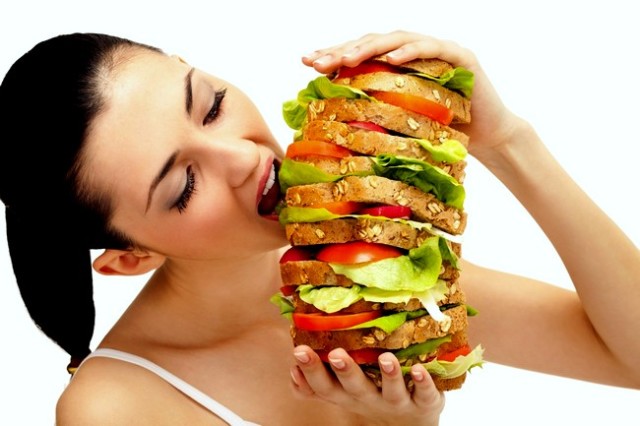
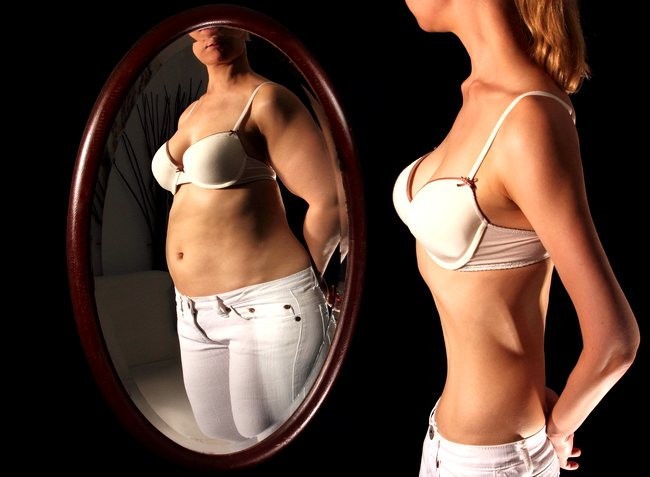

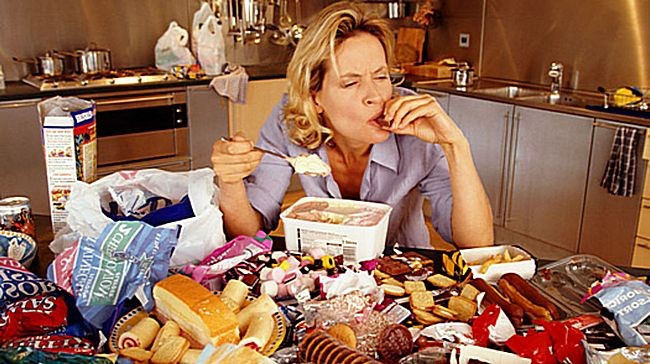



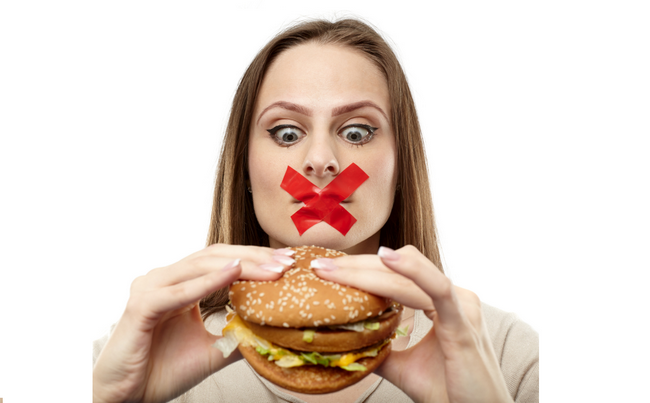
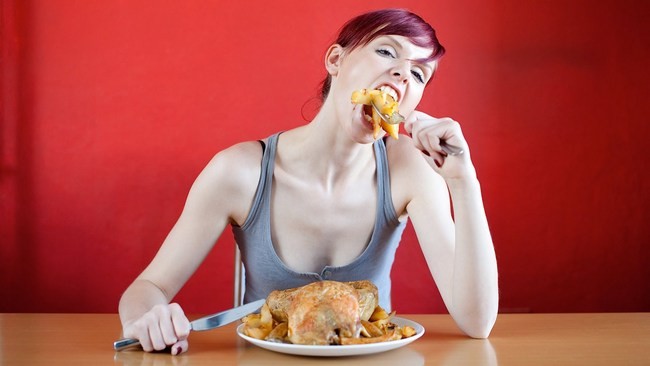









Comments
a couple of years ago, there was no side of metrogils from the same problem, there were no side effects ...
I’m not a fan of peeling at all, it saves from acne of metrogil, it also smoothes it ...
Great article! ...
I take the second course of the Capsules Climafite 911. The tides went very quickly. It became calmer, irritability went away and I sleep well ...
i also noticed - it is worth nervous, everything immediately affects the face. Therefore, I try to avoid conflicts and unpleasant people. Of the creams, I like Miaflow from wrinkles - smoothes not only small wrinkles ...